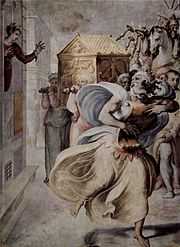Michal
Two window scenes


Michal (Hebrew: מיכל) was a daughter of Saul, king of Israel, who loved and became the first wife of David, (1 Samuel 18:20-27) who later became king of Judah, and later still of the united Kingdom of Israel.
Michal in the Bible
Their story is recorded in the Book of Samuel. It is recorded that she chose the welfare of David over the wishes of her father. When Saul's messengers were searching for David in order to kill him, Michal secretly sent them away while pretending he was ill and laid up in bed. She let David down through a window and hid teraphim in his bed as a ruse. (1 Samuel 19:11-17)
Whilst David was hiding for his life, Saul gave Michal as a wife to Palti, son of Laish, and David took several other wives, including Abigail. (1 Samuel 25) Later when David became king of Judah and Ish-bosheth Michal's brother (and Saul's son) was king of Israel, David demanded her return to him, in return for peace between them. This Ish-bosheth did, despite the public protests of Palti.[2]
These events have raised moral issues within Judaism, especially in the context of the prohibition in Deuteronomy 24:1-4. On the one hand, some argue that it is prohibited to re-establish a marriage with a previous spouse who has subsequently remarried. On the other hand, other commentators explain that David had not divorced Michal at this point in time, but rather Saul acted to break their marriage by marrying her off to another without David's consent.[3] On that view, they were not technically divorced as David had not issued a writ of divorcement according to biblical law.
After Michal was back with David, she criticized David because he danced, partially unclothed, as he brought the Ark of the Covenant to the newly captured Jerusalem in a religious procession. (2 Samuel 6:14-22) Michal died barren and childless, as stated in 2 Samuel 6:23. Steven McKenzie, author of King David: A Biography, suggests that David prevented Michal and her other surviving relatives, such as Meribaal, from having children in order to extinguish the line of Saul and deny potential rivals to the throne.[4]
A contradiction concerning Michal dying childless appears in most [5] translations of 2 Samuel 21:8 where there is mention of "the five sons of Michal the daughter of Saul". According to Gill, the full phrase in 2 Samuel 21:8 is "the five sons of Michal the daughter of Saul, whom she brought up for Adriel the son of Barzillai the Meholathite". Now, Merab, Michal's older sister, was the wife of Adriel (1 Samuel 18:19). According to Gill, these five sons were not birthed by Michal but were brought up or educated by Michal after Merab perhaps had died; i.e., Merab brought them forth, and Michal brought them up. [6] However, the Hebrew word, ילדה, which Gill understands to mean "brought up," everywhere else means "gave birth to."
Unlike Abigail and Bathsheba, Michal is not described as being beautiful, although according to Louis Ginzberg, the Rabbinic tradition is that she was of "entrancing beauty."[7]
Michal in poetry
- The Israeli poet Ra'hel Bluwstein sees a parallel between herself and Michal:
"Like you I am sad, O Michal ... and like you doomed to love a man whom I despise." (Poem "Michal" in her book Flowers of Perhaps.)
- "Michal"
- “And Michal, Saul’s daughter, loved David
- And she despised him in her heart”
- Michal, distant sister, time’s thread has not been severed,
- time’s thorns in your sad vineyard have not prevailed.
- Still in my ear I hear the tinkling of your gold anklet,
- the stripes in your silk garment have not paled.
- Often I have seen you standing by your small window
- pride and tenderness mingling in your eyes.
- Like you I am sad, O Michal, distant sister, and like you doomed to
- love a man whom I despise.
- Or alternatively translated:
- "Michal"
- Though years divide, we’re sisters yet;
- Your vineyard stands though weeds invade;
- Still tinkle anklet, amulet;
- Your red silk garment does not fade.
- By a small window still you stand,
- Proud but a death within your eyes.
- My sister, I can understand –
- Who also love whom I despise.
- 1927, Israel
- Translated by Robert Friend
Use as a name
"Michal" was one of the Biblical names embraced by Zionism, very rarely found in pre-Zionist communities. It is a very common female first name in contemporary Israel.
Polish popular male first name "Michał" is a local form of "Michal".
| Wikimedia Commons has media related to Michal. |
Notes
- ↑ Ellen White, "Michal the Misinterpreted," JSOT 31.4 [2007] 451 – 464.
- ↑ 2 Samuel 3:13-16
- ↑ Though the Book of Deuteronomy attributes itself to the period of the Hebrews' Exodus from Egypt, many historians regard it as having been actually written during the late monarchy. David's appearing to be oblivious to the prohibition laid down in it seems additional evidence in support of such theories.
- ↑ Steven McKenzie, Associate Professor, Rhodes College, Memphis, Tennessee
- ↑ The New International Version of the bible uses Merab from two Hebrew and some Septuagint manuscripts but cites that most manuscripts say Michal
- ↑ See John Gill commentary on 2 Samuel 21
- ↑ Louis Ginzberg, The Family of David in The Legends of the Jews, Vol. 4.